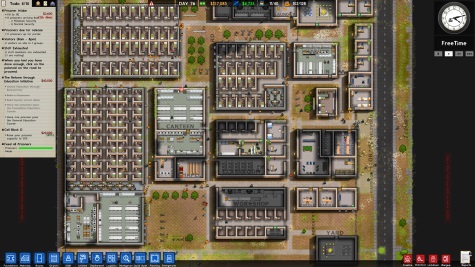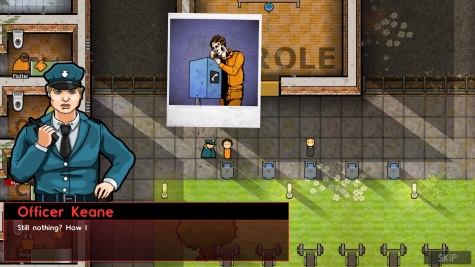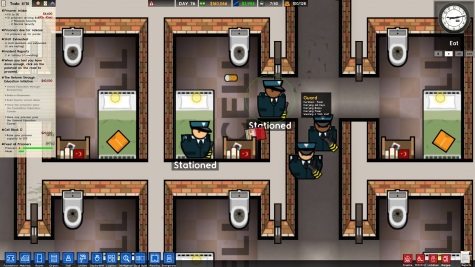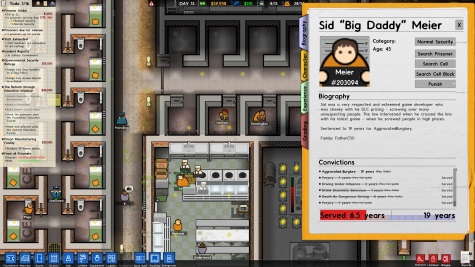Honestly the premise for this game sounds like it could be incredibly exploitative and edgy but you have to admit that it’s original. I can’t think of anyone who has tried applying the tycoon formula to the building and running of prisons before so I had my eye on it even while it was in Early Access. Surprisingly when it was finished the game was received fairly well. It turns out to be a somber, serious and thoughtful take on what goes on in prison. I even liked the game’s story, simple as it is. I say that for very few games these days.
The story is told over the course of a campaign that also functions as the tutorial. There’s no point summarizing the story as it’s fairly minimal but it touches upon the relevant issues: what drives a man to become a criminal, whether prisons should repress prisoners through fear and punishment or to seek to reform them, the profit motive in the running of prisons and how it leads to corruption, even the subject of execution comes up and is treated with respect. Nothing groundbreaking, but I think it makes for a great example of how to do storytelling in games. The game manages to convey an impressive amount of emotion through the simple icons that represent each prisoner and the Polaroid photos to reinforce important dramatic moments work very well.
Gameplay works pretty much as you’d expect. You designate buildings to be constructed, equip them with objects, build utilities, hire workers, control the intake of prisoners and even set the prison’s policies and daily schedule. The prisoners have needs and if you leave them unfulfilled for too long it leads to them attacking staff and starting riots. Needs include the usual like food, recreation and sleep, but there are a lot more of them in this game. Many of them have yearn for religion so you need to build them a chapel. In a game with seasons turned on, keeping them warm in cold weather is a must. Staff that you can hire include workmen who do the construction work and other menial jobs, various types of guards, cooks, janitors and so forth.
I think how the system sets up income is particularly clever. You get a fixed amount of money when you accept prisoners and a regular payment every day. This varies according to how dangerous the prisoner is. You also get a “days without incident” bonus that is very valuable. An incident is whenever there is an act of violence or an escape in your prison. The bonus rises you longer you go without an incident so you have a strong incentive to keep things orderly. In addition to this, there is a parole system. Typically you need to have your prisoners successfully go through reform programs like treating their drug or alcohol addictions or getting an education to have a decent chance of being paroled. But getting a prisoner released early in this way nets you a substantial bonus that helps a great deal to fund prison expansion.
That said, the layouts in this game aren’t too complex given that it’s all 2D. No multi-level prison complexes for you here. I’m not sure that it’s even that necessary to have intricate layers of walls and locks. That slows down the foot traffic a lot and most escapes that I’ve seen are prisoners building tunnels. You can gain a lot of efficiency by doing weird layouts like packing recreational objects and shower heads in your yards, but I don’t like these unrealistic and gamey designs. Things get more complicated when you have both hot and cold water pipes but it’s still not too bad. I don’t think this game has too much of a replay value since once you’ve built one successful prison, there’s not much reason not to go for the same design. You can always repeat the same cell block again and again as necessary to expand the prison.
I still became rather addicted to this game due to how satisfying it is to watch the prisoners and the staff go through their routines. The detail here is fantastic as you can drill into the profiles of individual prisoners and there are little Easter eggs littered everywhere. I had to squeal in delight that time I found Gregor Clegane from Game of Thrones as a prisoner. Escape mode allows you to experience your own prison from the perspective of a prisoner and additional options like gangs or needing to fulfill the needs of staff add plenty of extra challenge for those who need it. There are still some frustrations. For example, there are times when I couldn’t figure out why my janitors seemed to idling when my prisoners were complaining about not having a fresh set of clothes and my laundry facilities were unoccupied. But these are the usual niggles in management sims.
It should be obvious that I like the game quite a bit. It strikes me as an ideal medium size game, not too complex but not too simple, not epic in length but long enough to be satisfying. It’s novel enough that it doesn’t feel like a retread of a familiar game and it’s respectful of a tricky subject matter. If you like tycoon games at all, you should give this one a whirl.



